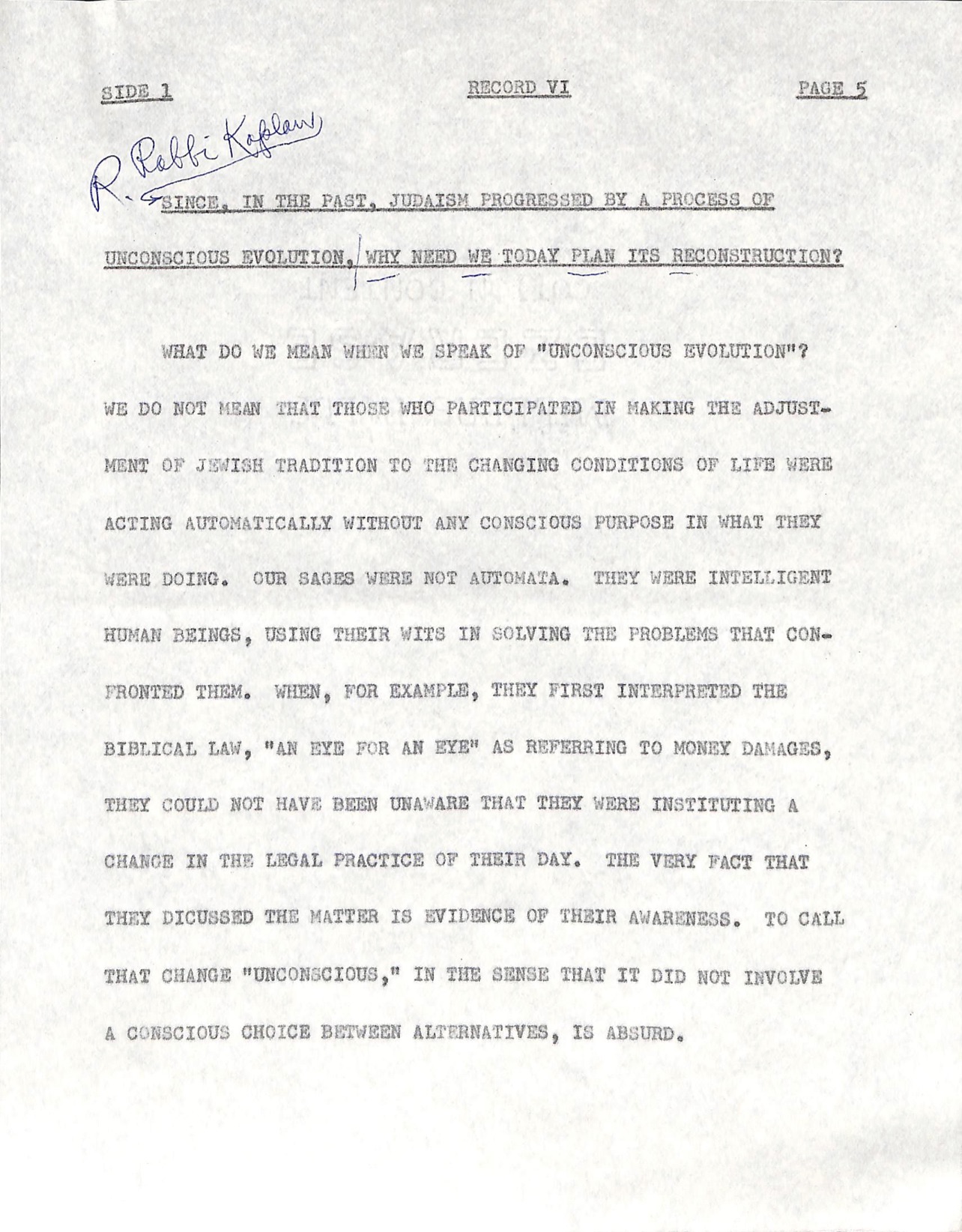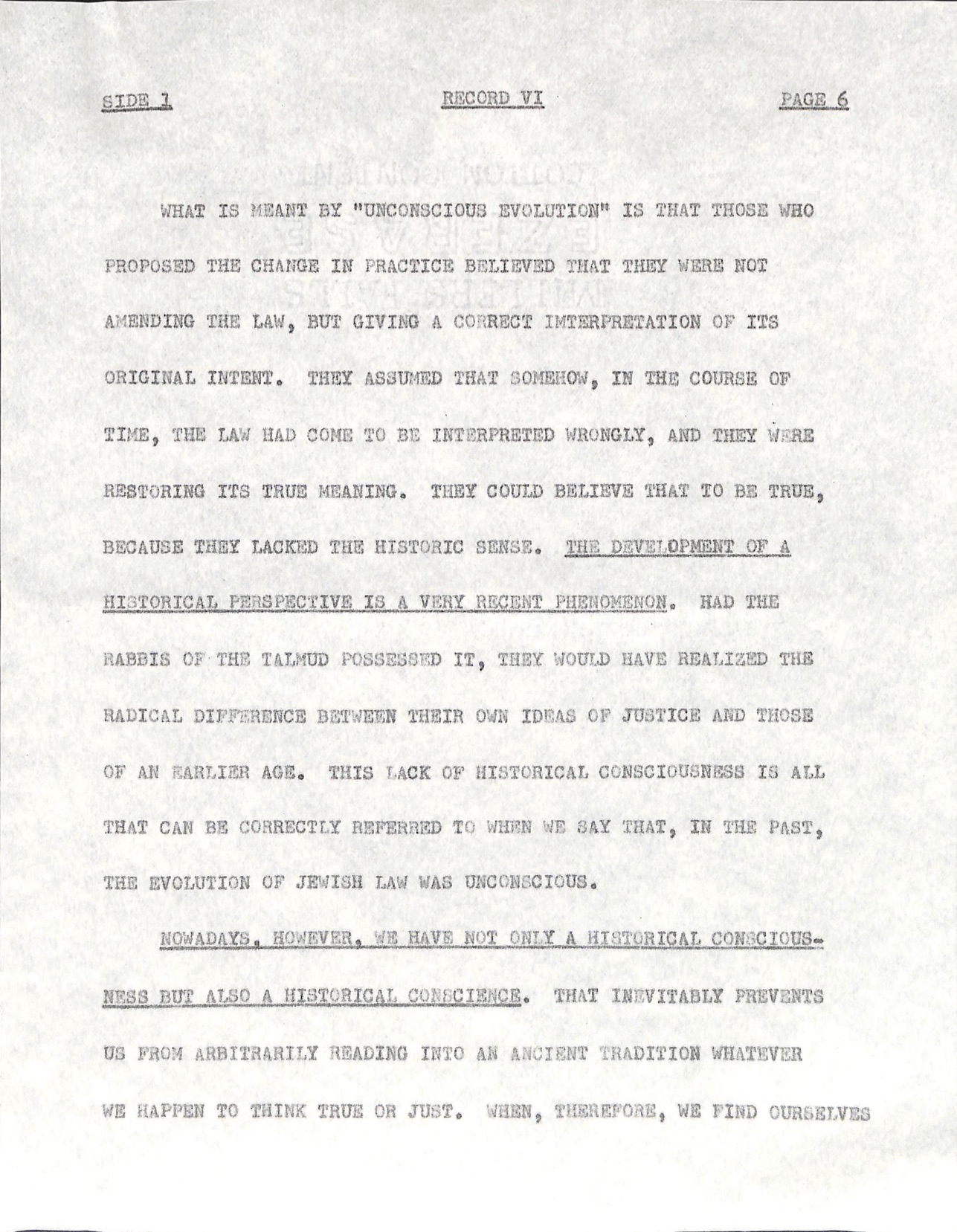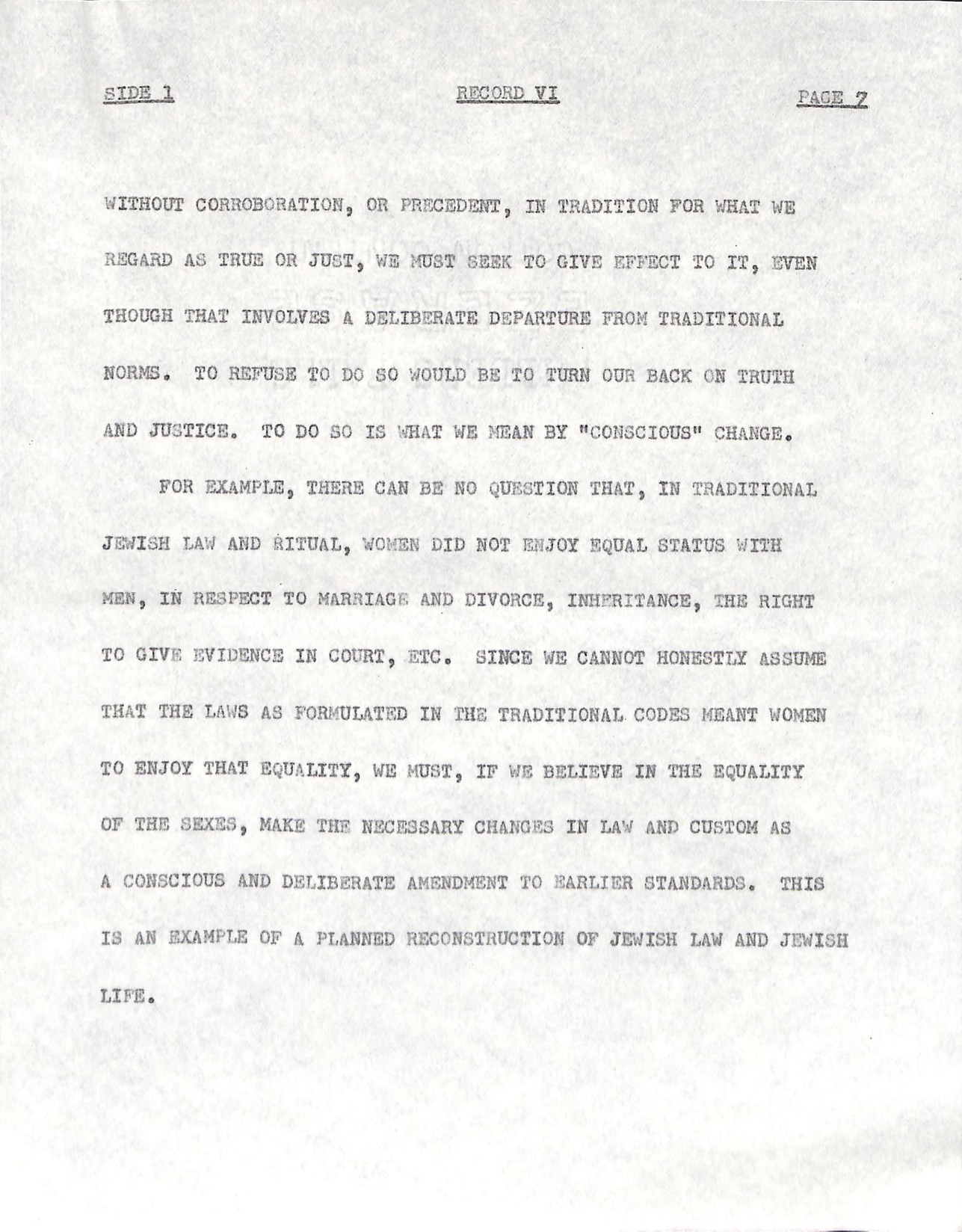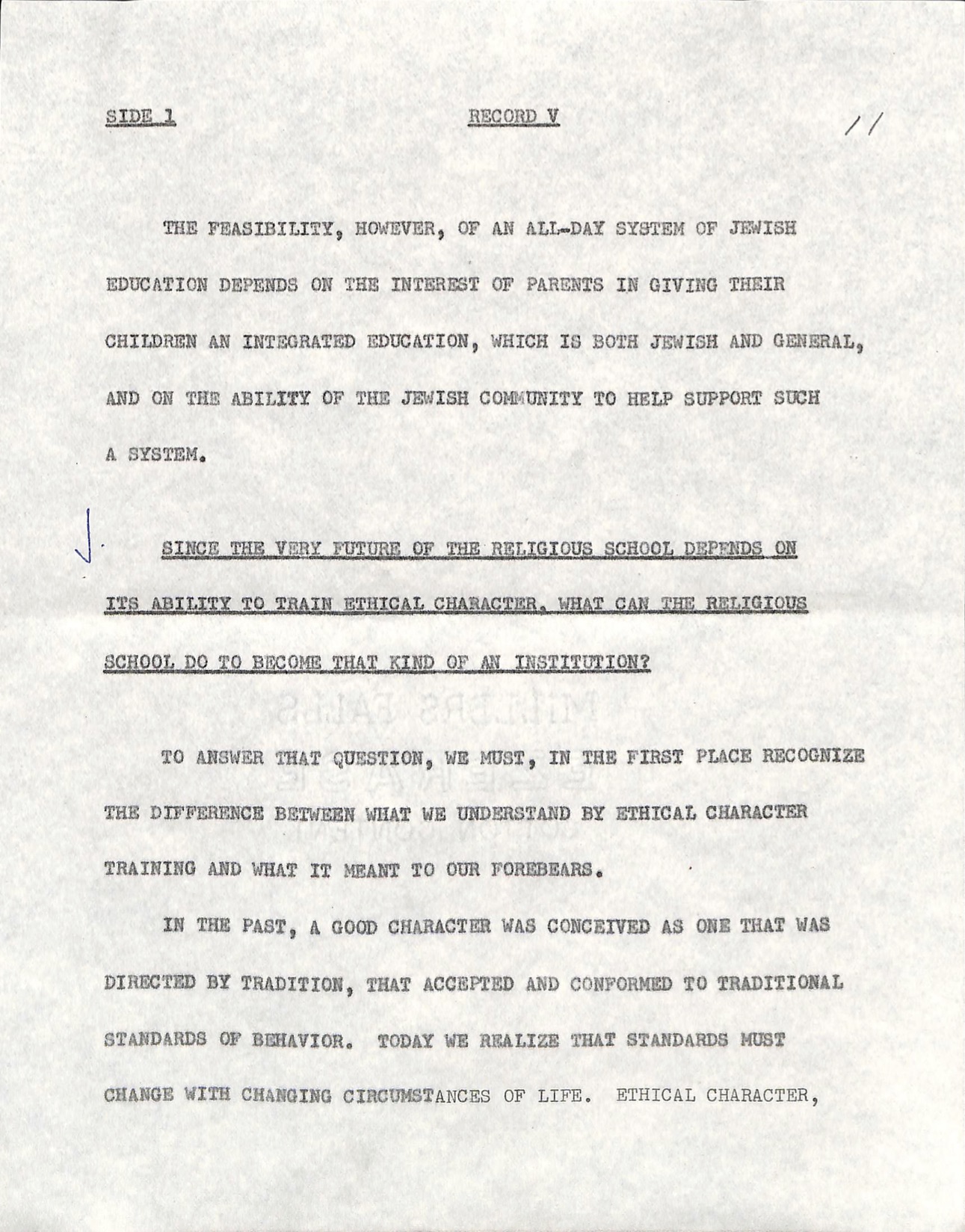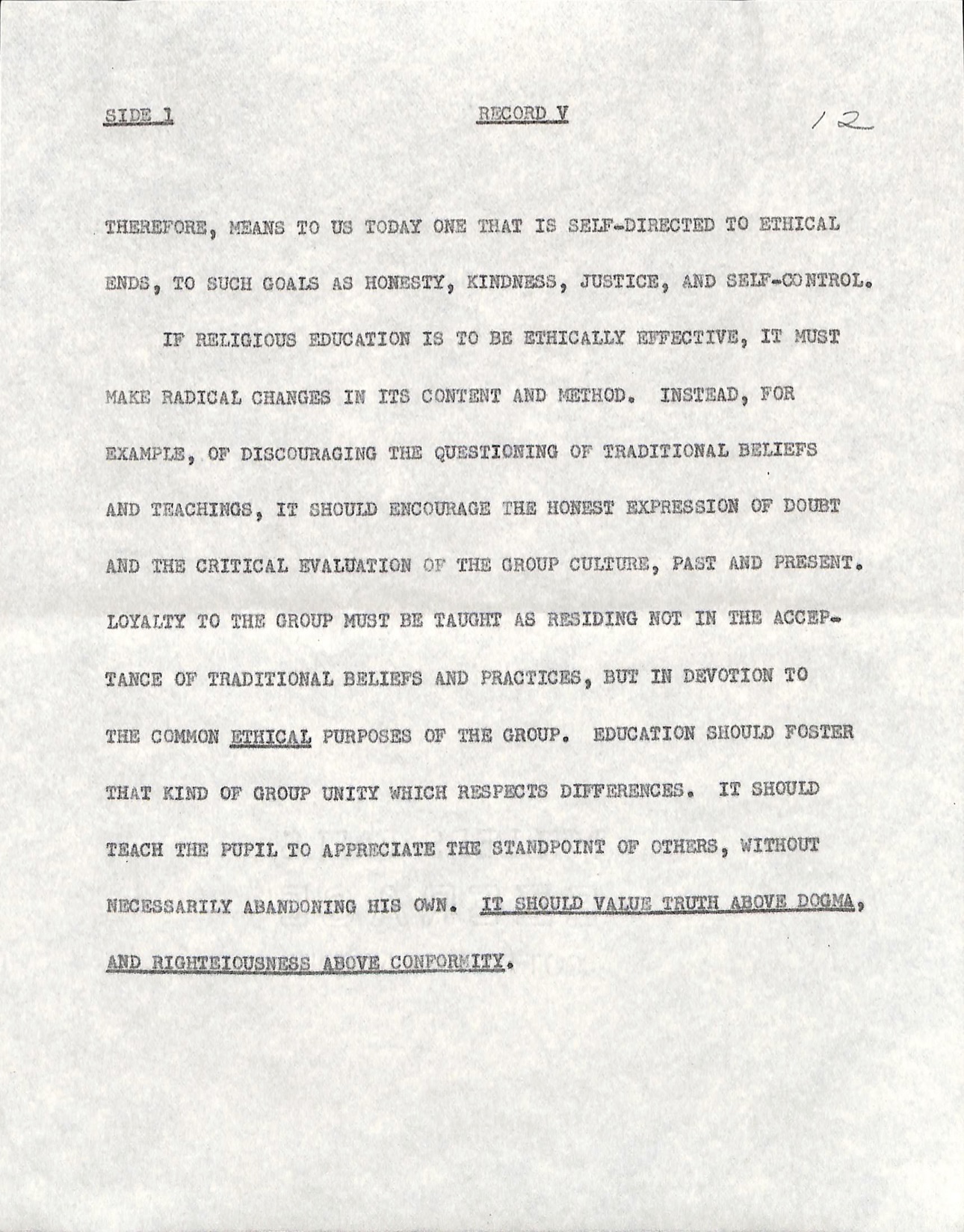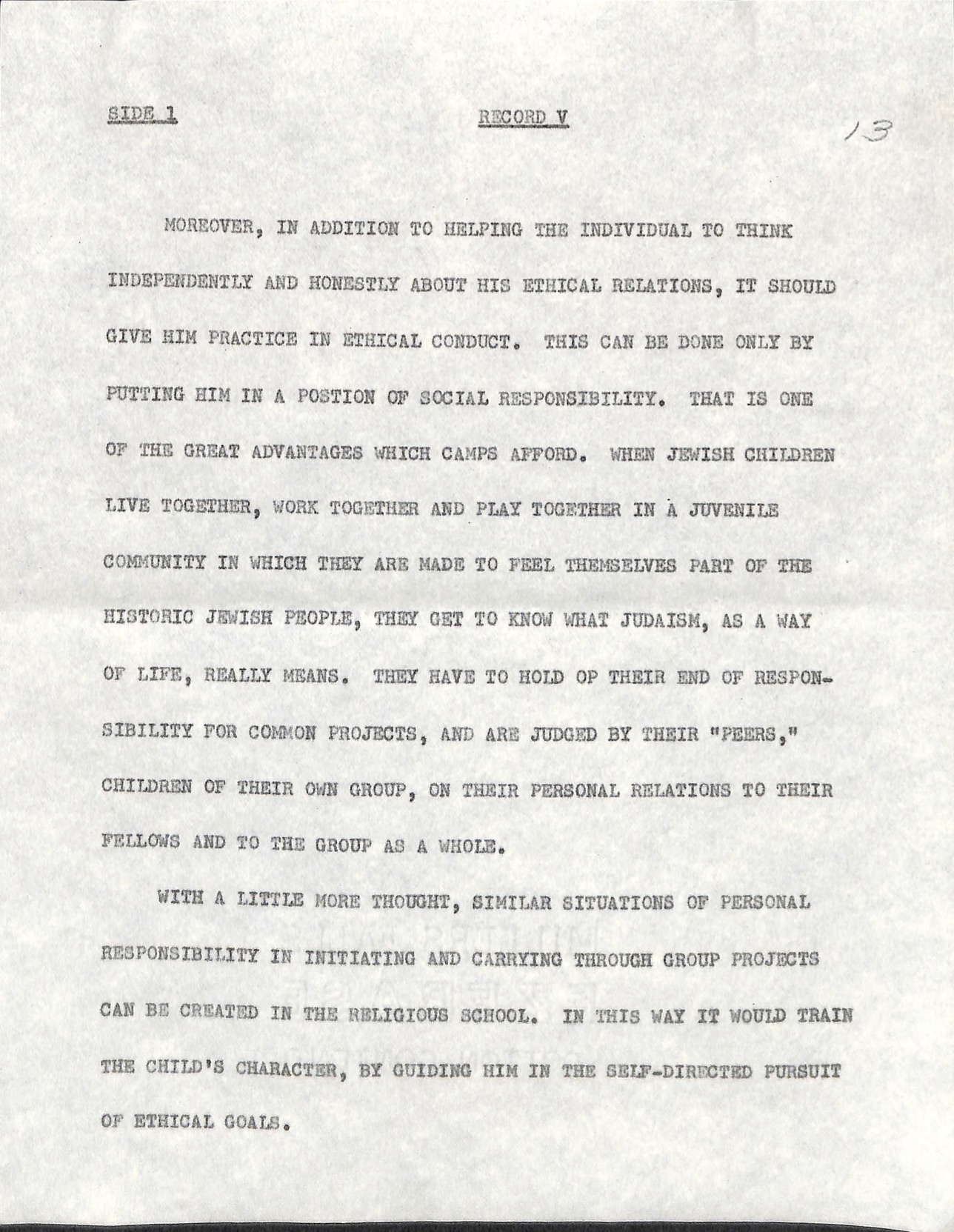In these five clips, Rabbi Kaplan’s vision about the power of Judaism, and particularly Reconstructionism, to shape a whole person comes through. He touches on character, intentionality, enthusiasm, ritual, embodiment, Bible, theology, religious schools, yeshiva and much more.
The Reconstructionist program is here to indicate a way out of the present crisis. This has come about during the last decade. No serious attempt at conserving and fostering Jewish life, whether among the Orthodox, the Reform, or the Conservative or secularist wings has escaped the influence of Reconstructionism. Reconstructionism has stiffened the intransigence of the Orthodox. It has induced the reform group to restore the centrality of peoplehood in its conception of Judaism. It has impelled the Conservative group at long last to issue a new prayer book which is a pale imitation of the one published by the Reconstructionist Foundation. It has contributed to a more affirmative attitude toward religion on the part of some of the outstanding secularist leaders. It is, to this day, the one movement that is articulately agitating for world Jewish unity and for local organic communities. It is therefore no exaggeration to say that no group of Jews has influenced the thinking of American Jewry from the standpoint of its perpetuation and enhancement as much as has the SAJ. That goes for rabbinical seminaries and organizations as well as lay Jewish bodies. This is indeed a sad reflection on those institutions and organizations and sufficient reason for tempering whatever pride we might take in our own achievement. It would be entirely out of keeping with the ethical spirit of Reconstructionism if I were to conclude on this self-gratulatory note for we must not, even for the sake of morale and heightened enthusiasm, turn a blind spot on that part of the situation which is not likely to flatter our vanity. That is the part to which I must, in all conscience, not fail to direct your attention.
In human life, generally, it is a fact that while on a collective scale, we may soar to the highest heights of the spirit. Individually, we do not always present a very pretty picture. No forest is as engaging when we find ourselves amid the thick clutter and brush of its individual trees as when we view it from a distance as part of a landscape. The same is true of greater organizations and institutions, and the SAJ is no exception.
Though we have succeeded as a group in making our influence felt on behalf of an affirmative Judaism throughout the length and breadth of this land, we have not made enough headway within our own households. Truth to tell, we at the SAJ have been far from successful in transmitting to our own children the faith and idealism which marked the establishment of the SAJ. Who is to blame? No doubt forces beyond our control, the tensions of contemporary life, the unprecedented fears, the drives to escape our anxieties by every available diversion have had much to do with preventing those who represent our future from achieving an interest in Jewish tradition or a burning zeal for righteousness or an abiding love for God and man. May I therefore implore you on this occasion, when we signalize the 30th anniversary of the establishment of our society, to rededicate ourselves to the purposes which have called it into being.
I know of no better way to do that than from time to time to meditate on the statement of the principles published in the SAJ by the SAJ in 1925, reprinted in our annual diaries, and now incorporated in our prayer book. That statement is intended to replace the dogmatic creeds which derive from an authoritarian approach to Judaism. It is meant, however, to serve those functions of a creed which are compatible with freedom of thought, the functions of a confession of faith, of a standard of self-evaluation, and of a prayer for strength and hope. Let us now turn to that statement and spend a few minutes in silent meditation. May God grant that we translate our will to live as Jews into those wants. May He give us the strength of will and purpose to live our lives in that spirit and with a view to their fulfillment.
With regard to the revitalization of religion, bringing religion back into life. There's a general principle which applies to all, and herein with some religions, and to all expressions of religion. And that is the principle formulated in item six. The revitalization of religion can be best achieved through the study of it and the spirit of free inquiry. The traditional practice of making all questions of religion taboo, of quieting down, shutting down anyone who doubts or questions any tradition, or anything that has come down from the past on the authority of the past. That can no longer have a place in Jewish life if Jewish life is to witness the revitalization of its religion. Only by encouraging, not merely permitting, but actually encouraging the spirit of free inquiry. And you know that we Jews, in our very tradition, have been taught a lesson in this principle of inquiry but we've never understood the lesson. That lesson has brought us every piece of here. Night, when we have the children at the table and they are taught to ask, "[foreign], why is this night different than other nights?" The four questions. Unfortunately, that has become a fixed formula. It's not dynamic with us and so we think that's all the questions that a child should ever ask his parents about Judaism. This is only a model lesson. This should be a lesson to all who celebrate the Pesach. How to conduct Jewish religious education every day of the year and not merely on Pesach night. Mainly, do something every day for the child to arouse the interest of the child, so he'll ask you, "Why do you do this, Pop? Why do you do this, Mom?" That's the way we should have religion now taught and furthermore, we order that the spirit of religion be revived it is necessary to insist upon the separation of church and state.
We must regard that separation not merely as a political matter, it is itself a highly religious and spiritual belief. And go toward which we must strive in our own country because we are not. When I say we now I mean I'm speaking now as an American for American citizens. American citizens are deluding themselves when they think that by bringing in a few rituals and ceremonies of the established churches into the schools they are teaching or revitalizing religion of their children, whether it be Catholic or Protestant or Jewish. Nothing of the kind. Religion is not revitalized in that way. Religion must be the result of independent thinking and the less of authority. There is to be exercise in the teaching and in the preaching religion and the practice of religion, the more religious, ultimately, the human being will become
That stage, you see each one has its image. The image of the one is a palace, of the other a temple, and now it's a yeshiva. And the orthodox who want to maintain that image call the university a Yeshiva University - you see? - in contradiction to the reconstructionists who call the university University of Judaism. This is very significant. You see how much each of these terms mean, and if we understand, well, it makes life interesting, really. The real trouble, I think, with most of our people and the relation to Judaism is that they find it boring. And if we could only get them to see how exciting and interesting Jewish life can be, I think that's the only way which we can really win them for Judaism. And this is what certainly I think this University of Judaism is attempting to do, at least trying to show Jews how interesting Jewish life can be. And so you have students, one takes dancing, the other one takes music, third takes theology, and the fourth takes Bible. And, I mean, so that we don't all have to take the one kind of study which only perhaps one out of three really enjoys.
